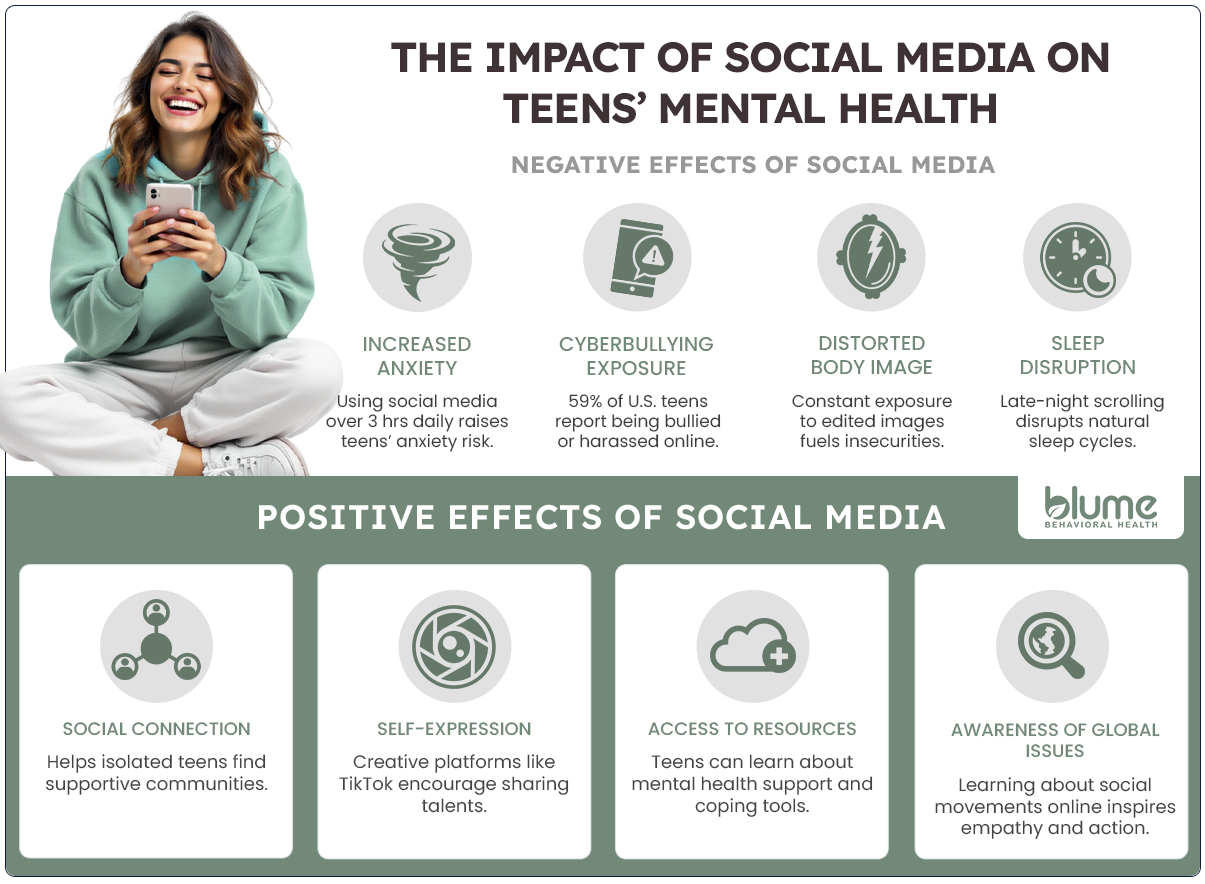The Impact of Social Media on Teens Mental Health
Table of Content

Social media is one of the most integral parts of all our lives, especially teenagers’ lives. While it offers a platform for connectivity and self-expression, it’s crucial to understand its potential impact on teen mental health. At Blume Behavioral Health, a residential treatment center for adolescents we are committed to addressing these concerns and providing guidance to help teens navigate the digital landscape safely.
The Influence of Social Media on Teen Mental Health

Social media can have both positive and negative effects on teen mental health. Let’s delve into some key aspects:
Positive Effects:
- Social Support: Social media can provide a sense of belonging and support, helping teenagers connect with like-minded individuals and seek advice on common issues.
- Creative Outlet: Platforms like Instagram and TikTok allow teens to showcase their talents and creativity, boosting self-esteem and confidence.
- Information and Awareness: Teens can access valuable information about mental health and well-being, reducing the stigma associated with seeking help.
Negative Effects:
- Cyberbullying: Online harassment and cyberbullying can lead to anxiety, depression, and low self-esteem.
- Social Comparison: Constant exposure to curated, idealized images on social media can lead to feelings of inadequacy and lower self-worth.
- Addiction: Excessive screen time and social media use can contribute to addiction, leading to neglect of real-life relationships and activities.
Understanding FOMO and FoMO
Fear of Missing Out (FOMO) and Fear of Missing Offline (FoMO) are two significant designations in the realm of social media and teen mental health:
- FOMO (Fear of Missing Out): This refers to the anxiety or unease teens feel when they believe they are missing out on events, activities, or experiences that their peers are enjoying on social media.
- FoMO (Fear of Missing Offline): On the flip side, FoMO signifies the unease some teens experience when they are disconnected from real-life experiences due to excessive social media use.
Understanding these designations can help teens and parents recognize the impact social media has on their lives.
How Blume Behavioral Health Can Help
At Blume Behavioral Health, we offer specialized programs and support for teens struggling with the impact of social media on their mental health. Our dedicated team of professionals is here to help teens develop a healthier relationship with technology and navigate the challenges they face in the digital world.
Call Blume Behavioral Health Today!
If you or your teenager is struggling with the effects of social media on mental health, reach out to us today. Blume Behavioral Health is here to provide the guidance and support needed to lead a happier and healthier life.
Frequently Asked Questions (FAQ)
How can I tell if my teenager is experiencing the negative effects of social media?
Look for signs of withdrawal, increased screen time, changes in mood, and decreased interest in real-life activities.
What steps can I take as a parent to help my teenager navigate social media safely?
Open communication, setting limits on screen time, and educating them about the potential risks are essential.
Are there specific social media platforms that are safer for teens?
It varies from teen to teen, but platforms with strict privacy settings and parental controls can be safer choices.
Is it necessary to completely restrict social media use for teenagers?
It’s not always necessary, but setting healthy boundaries and monitoring their online activity can be beneficial.
How can Blume Behavioral Health assist my teenager in managing their social media-related mental health issues?
We offer specialized counseling and therapy programs tailored to address these specific challenges and promote mental well-being.
Dr. Aneta Lotakov Prince is a board-certified psychiatrist with over 20 years of clinical experience treating adolescents and adults facing severe mental illness, co-occurring substance use disorders, and complex emotional and behavioral health challenges. Certified by the American Board of Psychiatry and Neurology, she holds an active DEA registration and California medical license. Dr. Prince’s patient-centered approach is rooted in compassion and driven by a dedication to improving quality of life and supporting long-term recovery. She remains deeply committed to empowering each individual she works with to build a life of purpose, connection, and resilience.
